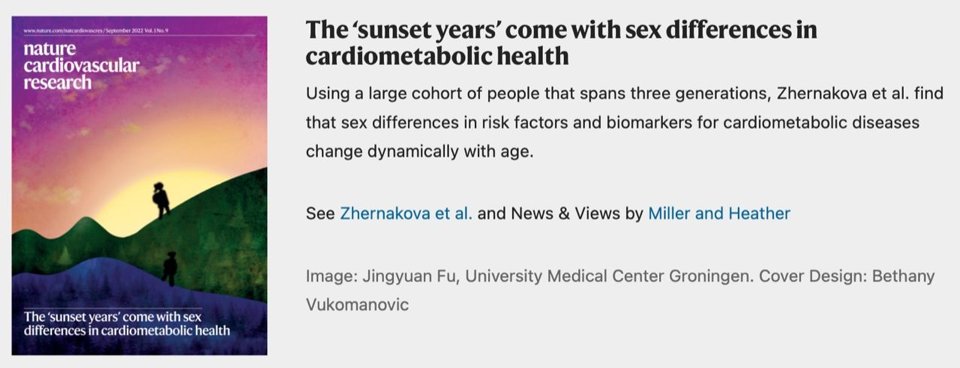
Cardiometabolic diseases (CMDs) are a major cause of death worldwide, but their incidence and clinical manifestations differ substantially between men and women. CMD risk factors can also differ between the sexes, with some factors showing a sex-specific effect on disease. We also know that the prevalence of cardiovascular disease increases with age and that the process of aging differs between men and women. We therefore thought that sex differences in CMD risk factors should be studied in the context of aging to capture their sex-dependent, non-linear progression with age.
In our study, we made use of detailed phenotype data available for the Lifelines cohort — a large cohort from the Northern part of Netherlands comprising more than 167,000 individuals from the general population — to assess sex differences in CMD risk factors and explore whether they change with age. We started by examining 51 clinical phenotypes and CMD risk factors in the whole cohort and then zoomed in on a subset of 1,440 individuals to study age-dependent sex differences in the plasma levels of 231 metabolites and 92 CMD-related proteins. We observed that sex differences in clinical traits are widespread, and that approximately one-third of these sex differences are not static and depend on age. For some factors, such as BMI, the difference between men and women is similar across different ages, whereas for other factors, such as systolic blood pressure and lipid levels, this difference tends to increase or decrease with age. While ageing in women is strongly affected by menopause, and about two thirds of tested blood parameters exhibited strong differences before and after menopause, the major CMD risk factors do not show strong menopause-associated effects.
Our results suggest that sex-dependent ageing may underlie the differences between the sexes in CMDs, which highlights the importance of accounting for both age and sex when assessing an individual’s risk of developing CMD. Future large longitudinal studies (including follow-up of this cohort) will be crucial for link the age dynamics of sex differences in these risk factors to the long-term effect on diseases and to provide options for early disease prevention.
This study is featured as the cover story in the September issue of Nature Cardiovascular Research (https://doi.org/10.1038/s44161-022-00131-8). Futhermore, it is highlighted and discussed in the “News and Views” article in the same issue: Cardiometabolic risk factors vary with age differently in females and males (https://www.nature.com/articles/s44161-022-00130-9).
The link to press release: https://umcgresearch.org/w/aging-affects-cardiometabolic-risk-factor-differences-between-men-and-women


